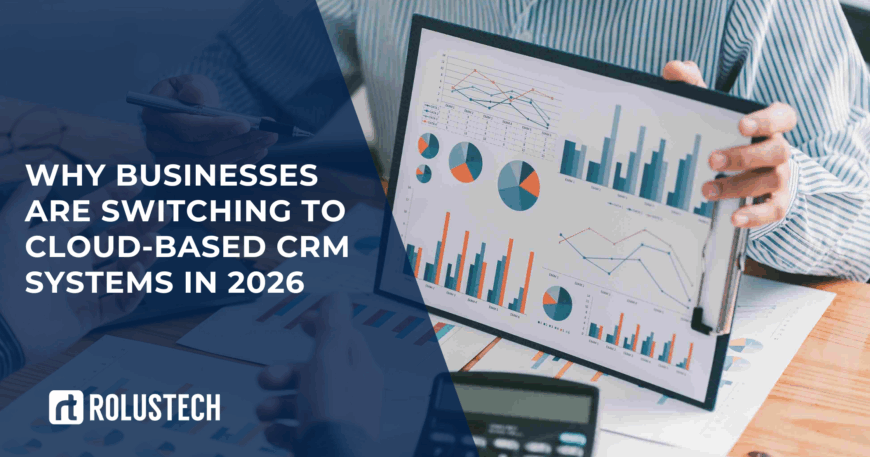The Rise of Cloud-Based CRM Systems
Businesses are moving faster than ever in today’s digital economy. Customers expect instant responses and seamless experiences. To meet these expectations, companies need tools that manage relationships efficiently.
That’s where cloud-based CRM systems are leading the change. Unlike traditional setups, they offer scalability, flexibility, and access from anywhere. By 2026, more businesses will be making the switch for a competitive advantage.
The rise of CRM in the cloud is not just a trend; it is a significant development. It’s a shift shaping how companies engage, sell, and grow.
What is a Cloud CRM? Understanding CRM in the Cloud
A cloud CRM is customer relationship management software hosted online. Instead of local servers, it stores data securely on the internet. Businesses access it through browsers or mobile apps.
This means no complex installations or heavy maintenance costs. Updates happen automatically, ensuring companies always use the latest version. Security features are stronger, with encryption and compliance certifications included.
In short, CRM in the cloud centralizes customer data, making it accessible across teams anytime, anywhere.
Benefits of Cloud-Based CRM for Modern Businesses
The benefits of cloud-based CRM go beyond convenience. Companies gain flexibility to scale as operations grow. Adding users or features is a simple and cost-effective process.
Remote teams collaborate better because everyone sees real-time updates. Sales, marketing, and support all work with the same data. That improves productivity and reduces errors.
Most importantly, cloud CRMs empower companies with analytics. They provide insights into customer behavior, helping organizations design better experiences and campaigns.
Cloud CRM vs On-Premise CRM: Key Differences in 2026
By 2026, the debate of cloud CRM vs on-premise CRM will be clearer than ever. On-premise systems require costly infrastructure, IT staff, and regular upgrades. Cloud CRM software, on the other hand, eliminates these barriers. Businesses pay subscription fees, gaining access to constant updates and lower upfront costs.
The biggest difference lies in accessibility. On-premise tools tie employees to offices, while CRM in the cloud works anywhere. That makes cloud solutions ideal for hybrid and remote workplaces.
Cloud CRM for Small Business: Affordable Growth and Flexibility
For small companies, adopting cloud CRM is a game-changer. They avoid massive setup costs and pay only for what they use. Cloud systems are user-friendly and don’t require dedicated IT departments. Owners and teams can manage customers, leads, and sales with minimal training.
As businesses grow, cloud CRM scales easily. Small firms can compete with larger enterprises by offering fast, personalized customer service.
Cloud CRM Software 2025–2026: Evolving Features and Capabilities
The features of cloud CRM software 2025–2026 are transforming business operations. Artificial intelligence powers predictive sales forecasts. Automation streamlines repetitive tasks like data entry and email follow-ups.
Integration with third-party apps is seamless. CRMs now connect with accounting, ERP, and marketing platforms. That reduces manual work and ensures consistent data across systems.
Mobile-first design is another highlight. Employees can access full CRM capabilities from smartphones, enabling faster decisions in the field.
Why Businesses Are Switching to Cloud-Based CRM Systems in 2026
Why are so many companies switching in 2026? The answer is that the benefits of cloud-based CRM systems outweigh those of traditional systems. Businesses gain agility, cut costs, and improve customer satisfaction.
The post-pandemic era cemented remote and hybrid work. Cloud CRMs perfectly support this model with accessibility and real-time updates. Security is another factor, as providers now offer advanced safeguards that small businesses could not afford independently.
Ultimately, switching to cloud CRM software in 2025–2026 ensures competitiveness. Companies that delay risk falling behind more agile competitors.
Challenges and Considerations When Moving to Cloud CRM
Adopting a cloud-based CRM system is not without challenges. Data migration from legacy tools can be a complex process. Businesses must plan carefully to avoid losing critical records.
Another challenge is integration with existing software. Companies should choose providers with proven compatibility and strong support. Training employees is equally important. Even simple systems need onboarding to maximize adoption.
Finally, cost planning is necessary. While cloud systems are affordable, businesses should carefully evaluate their subscription tiers.
Future of CRM in the Cloud: AI, Automation, and Scalability
The future of CRM in the cloud looks promising. Artificial intelligence will become central, analyzing data to predict customer needs. Automation will grow, freeing teams from repetitive work and improving accuracy.
Scalability is another strength. Businesses can expand globally without worrying about infrastructure. Cloud providers handle server management and performance optimization.
In 2026 and beyond, cloud CRM software will continue evolving. It will connect with IoT, offer advanced personalization, and reshape how companies build customer loyalty.
Conclusion: Embracing the Shift to Cloud CRM
The shift toward cloud-based CRM systems is no longer optional, it is essential. Businesses are embracing cloud solutions for flexibility, lower costs, and stronger customer relationships.
Whether you’re a small company or a global enterprise, moving to the cloud offers measurable benefits. The future of CRM lies in accessibility, intelligence, and scalability.
Now is the time to invest in CRM in the cloud. Those who adopt early will lead the market in 2026.
FAQs
What is the main advantage of cloud-based CRM systems?
The main advantage is accessibility. Businesses can access data anywhere with internet connectivity.
How is cloud CRM different from on-premise CRM?
Cloud CRM requires no servers or heavy IT management. On-premise needs costly hardware and upgrades.
Is cloud CRM safe for small businesses?
Yes, providers offer advanced security, including encryption, backups, and compliance certifications.
What are the benefits of cloud-based CRM for remote teams?
Teams collaborate in real time, access shared data, and work seamlessly across locations.
Why should businesses switch to cloud CRM in 2026?
Cloud CRMs are affordable, secure, and adaptable, making them essential for competitive growth.







